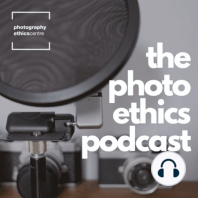2 min listen
Polly Irungu: On working intentionally
ratings:
Length:
46 minutes
Released:
Jun 2, 2021
Format:
Podcast episode
Description
In this episode, we talk with Polly Irungu on working intentionally. Polly reflects on her experiences growing up and going to university which led her to found the community Black Women Photographers. She describes how intentionality is central to everything she does - from her work as a photographer, to her work with radio news, and then to her work with Black Women Photographers. What you’ll find inside: “Photography was that creative tool, that creative outlet for me when I was in a really bad place and helped me find my voice again.” (9:09)“When you’re a self-taught photographer, you’re not taking a class classed ‘Ethics 101.’ You’re not learning about the things that typically or whatever is considered standard that’s ethically wrong – you’re not learning that as a self-taught photographer. And then, depending on what journalism school you go to, you may not even learn there either. I mean, you’ll learn like ethics within journalism, but how does that translate into the world of photography?” (10:40)“I want to leave this industry better than I found it.” (13:04)About the inception of Black Women Photographers (14:43)“What am I doing as a photographer, as a journalist, or as the founder of a community? What am I doing? How am I doing it? Where am I spending my time and energy? And, again, all those different questions that I ask myself, that’s just me trying to be more intentional about going about it.” (24:10)Relating radio journalism to photography ethics: “Who are we having on the air, and are they the best person to tell this story? … It’s like, how we approach that and how we are so mindful of the voices we bring onto the air.” (28:00)“Am I the best person? You know, I also have to ask that myself. Just because I’m Black or just because I’m a woman, am I still the best person for x y z? And so, I still say no to things. And I’m like, if I can say no, I know my counterparts who are white can also say no, and pass up an assignment, and can recommend someone else.” (31:55)“What would I be leaving behind? And would I be proud of that? And what work would I be leaving behind, and so would I be proud of that work? And so I guess that’s how I think about it a lot, and how I think about what work I say yes to and what work I don’t say yes to, because it plays a large part in the mark you’ll be leaving.” (33:23)What does photo ethics mean to Polly?“I feel like this definition is constantly changing. Again, I think there are fundamentals that everyone probably knows and sticks to, but then you go beyond that and then everyone should have their own personal line where they do not cross. And so, it’s so hard because when you think about the state of photography and how it’s still very white male dominated, and any time there is any ethical dilemma I feel like it comes from those white males who still dominate this industry. … My definition of ethics would be … different compared to what photography may be because, again, it wasn’t set up for someone like me to thrive in.” (39:42)Links:Black Women PhotographersWomen PhotographPhotoShelter Webinar with Alexis Hunley and Dee Dwyer
Released:
Jun 2, 2021
Format:
Podcast episode
Titles in the series (49)
Trailer: Welcome to The Photo Ethics Podcast: Find out what we mean when we say 'photo ethics' by The Photo Ethics Podcast
